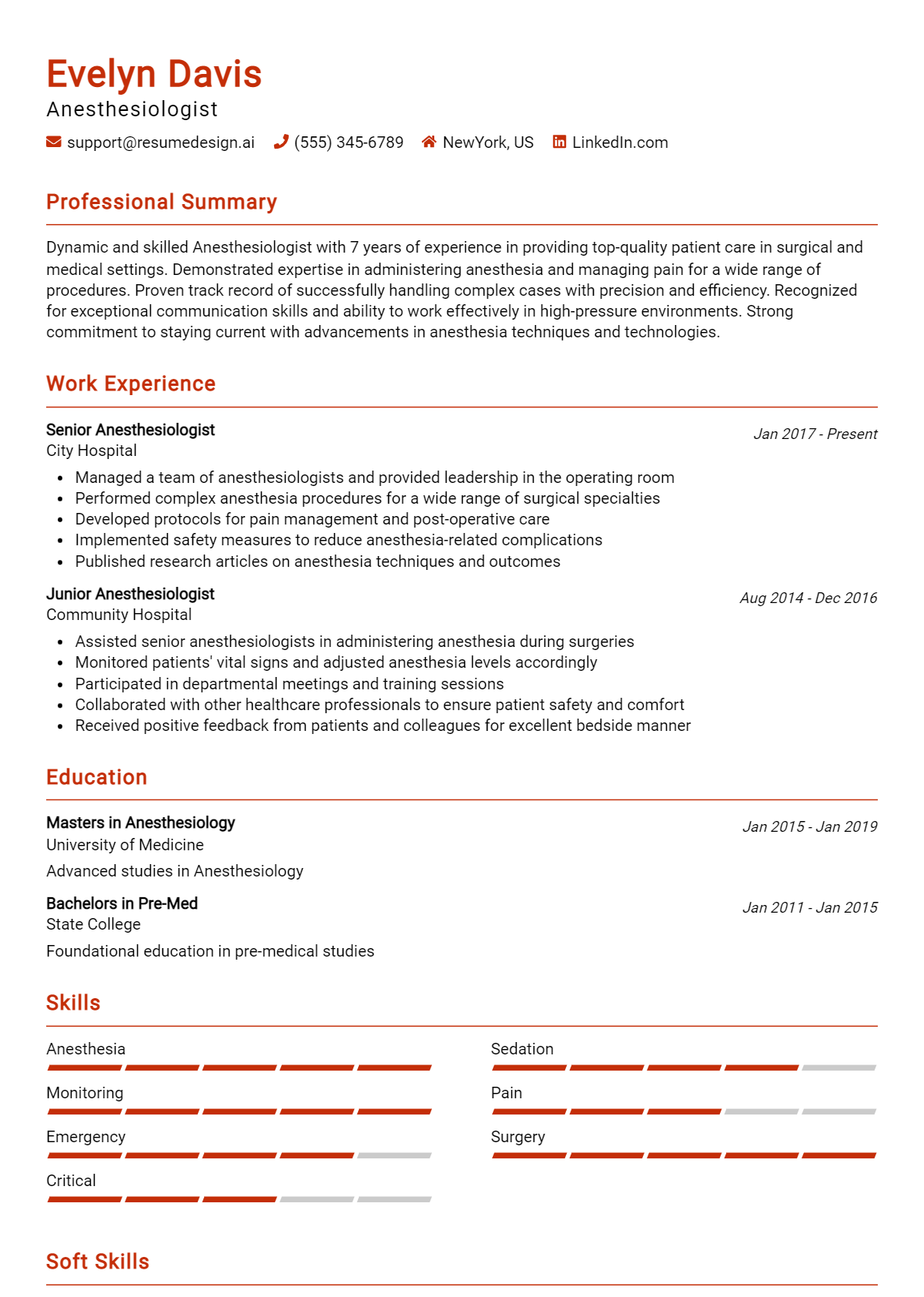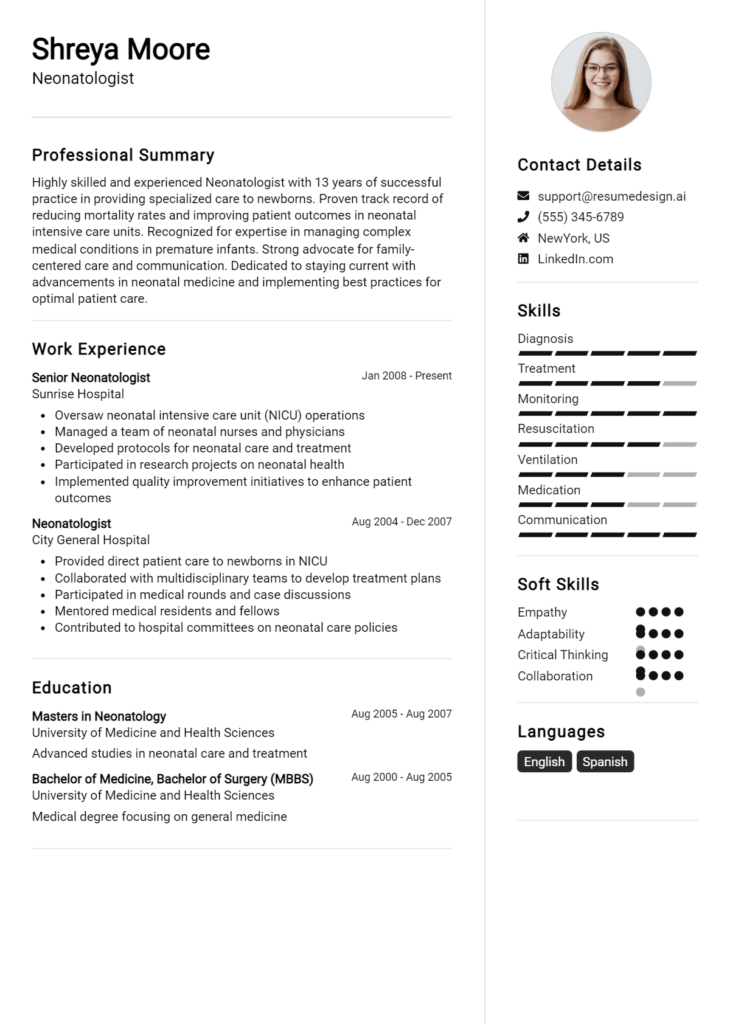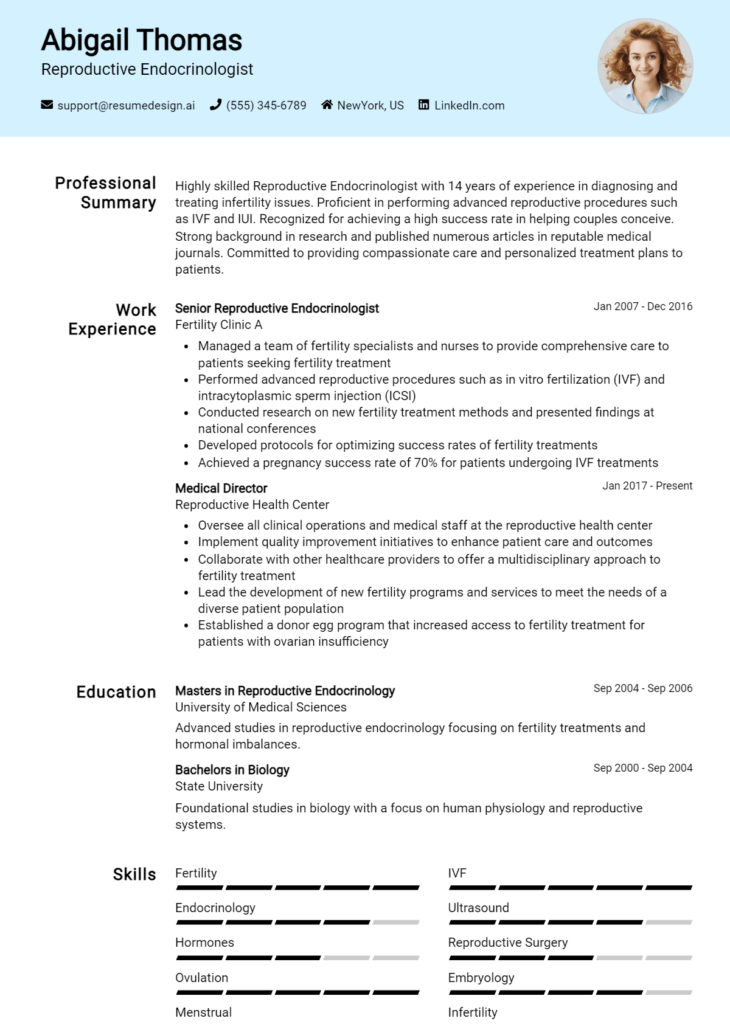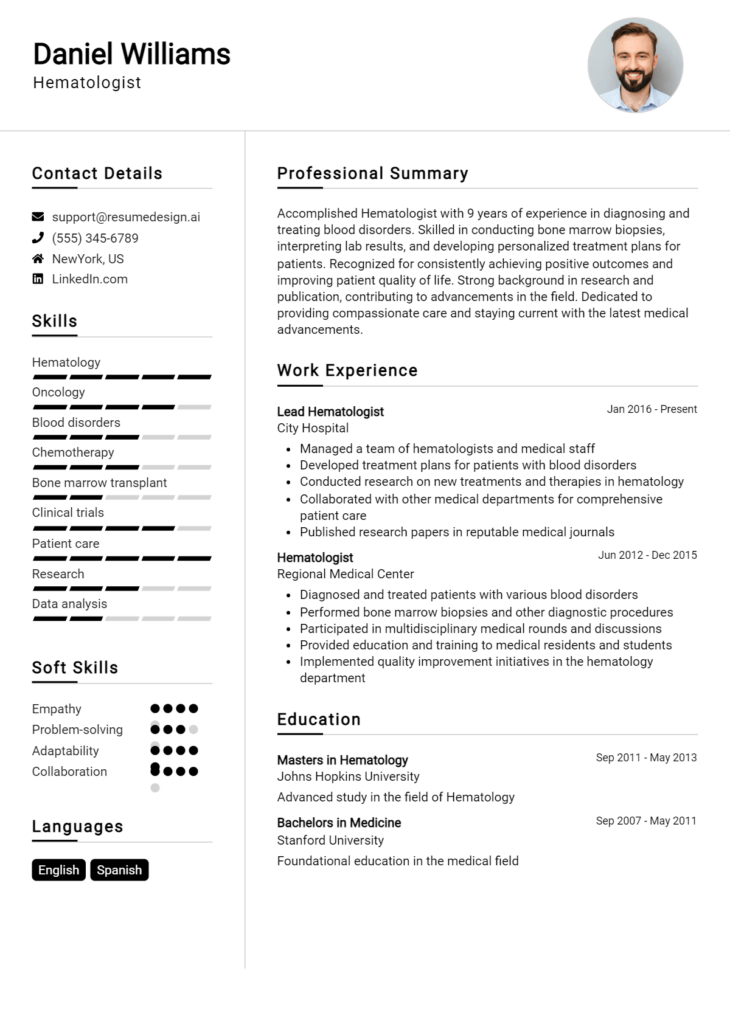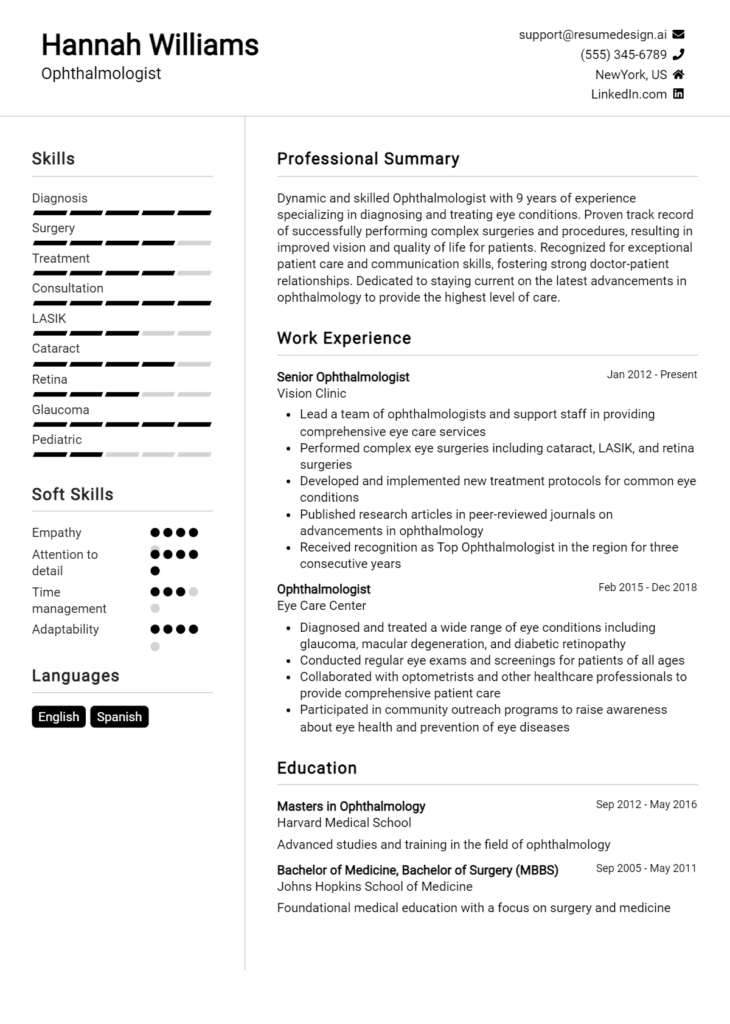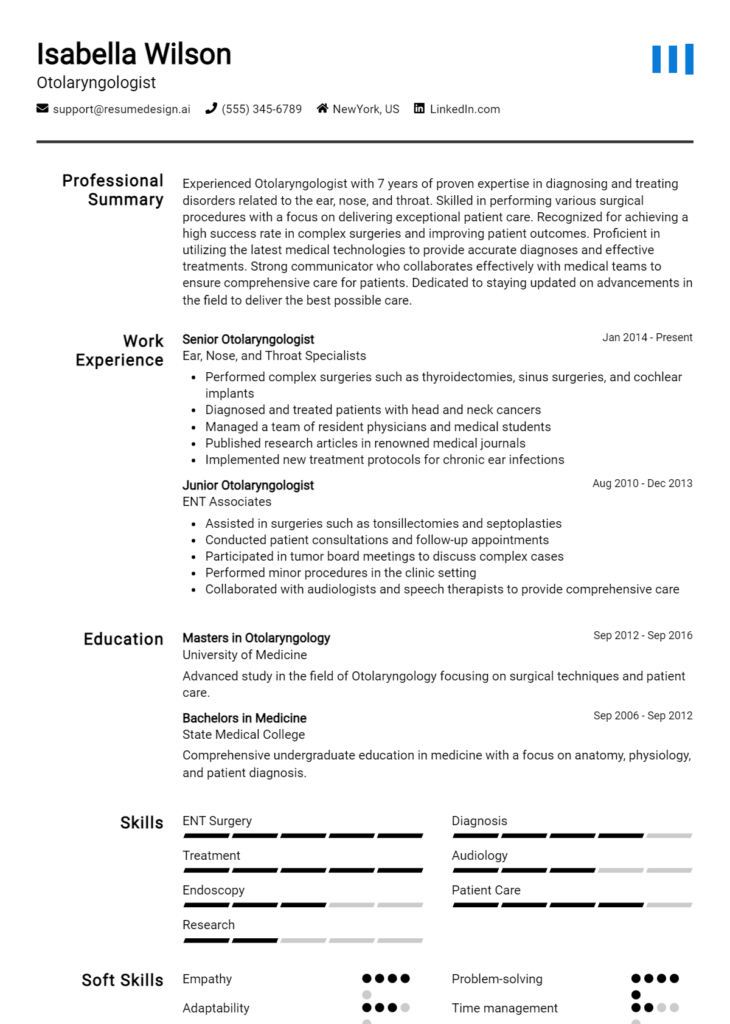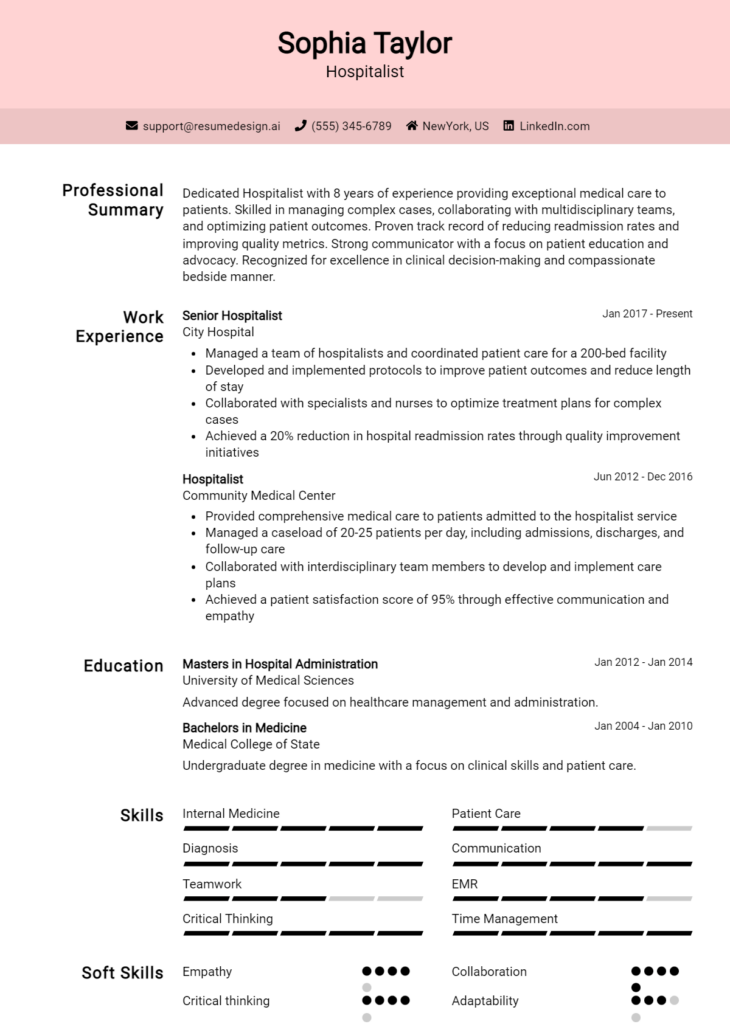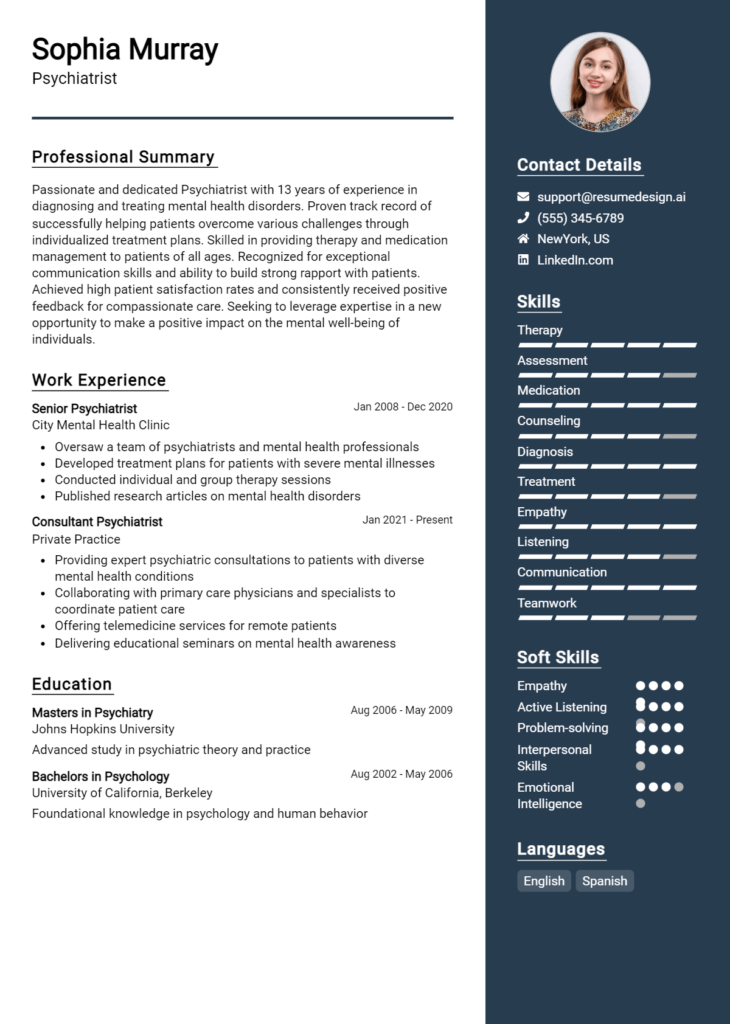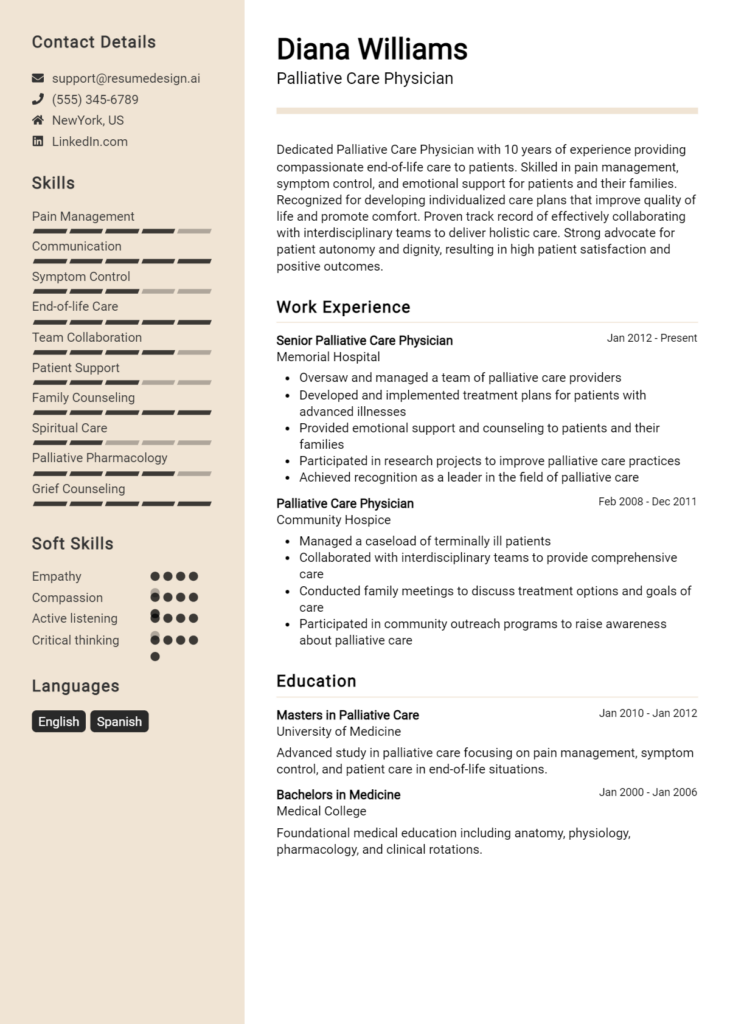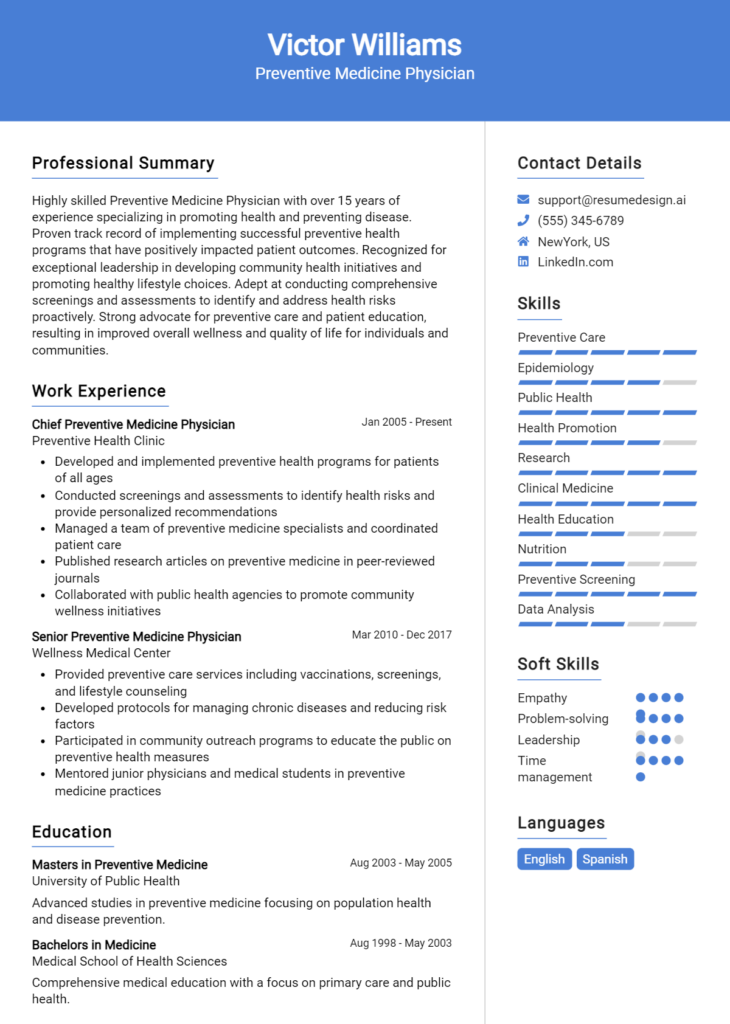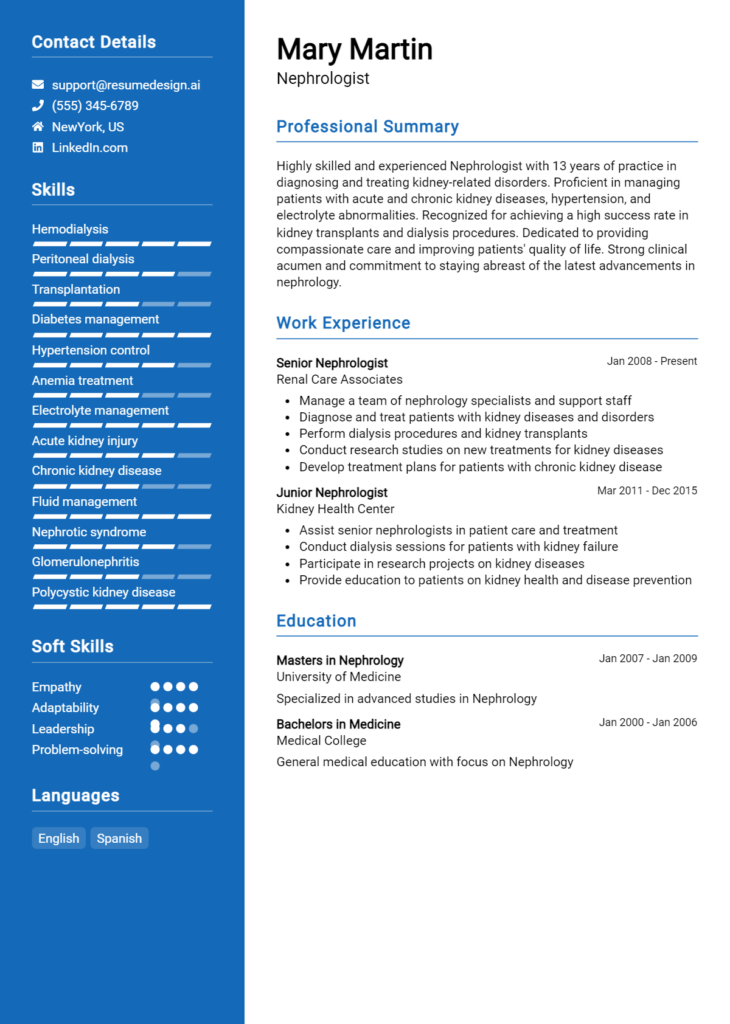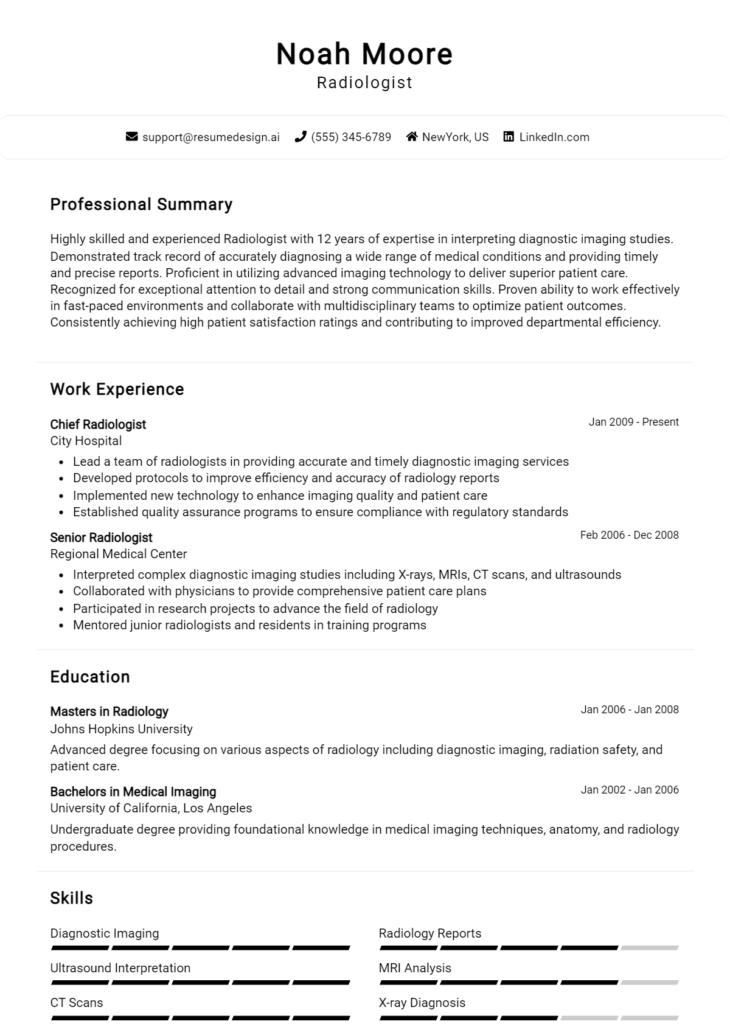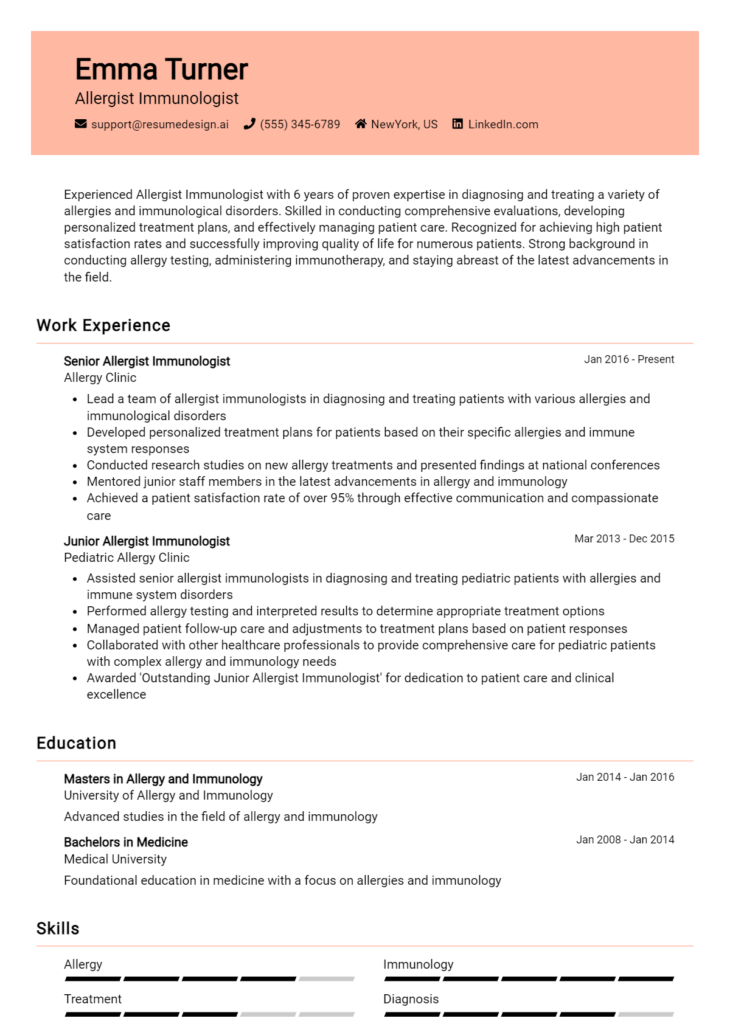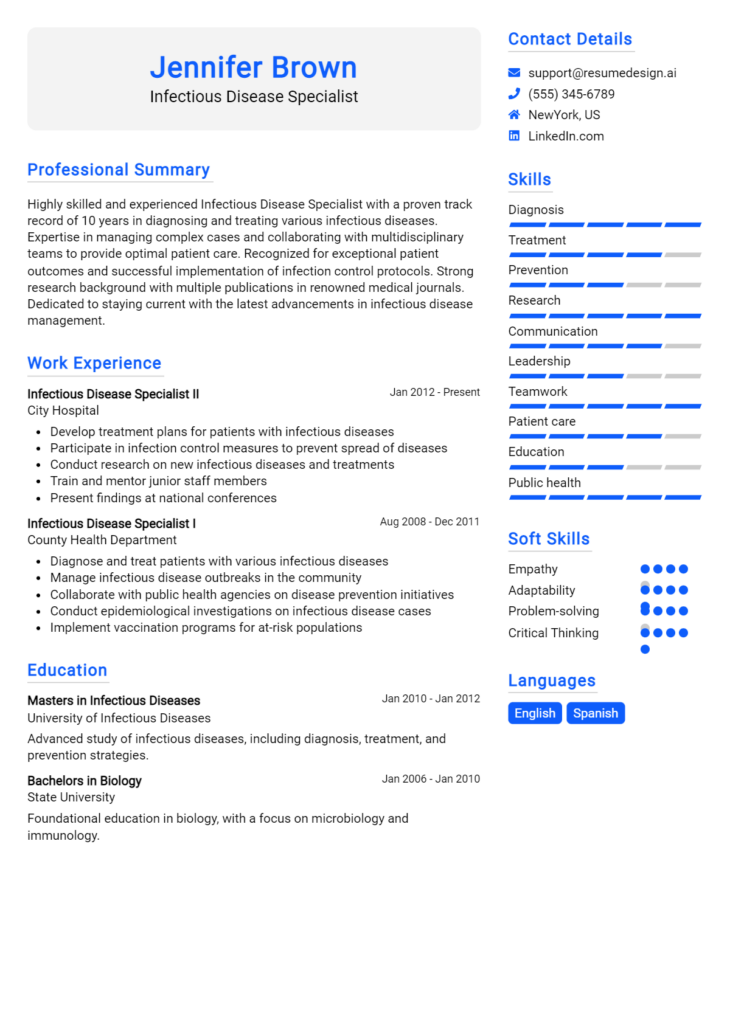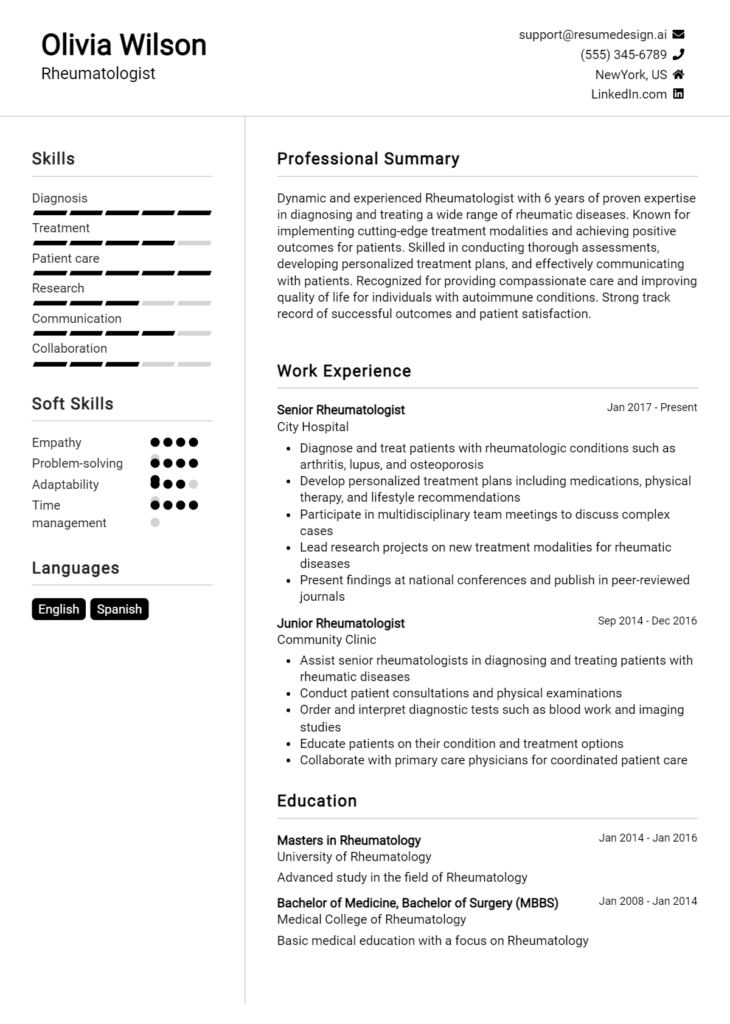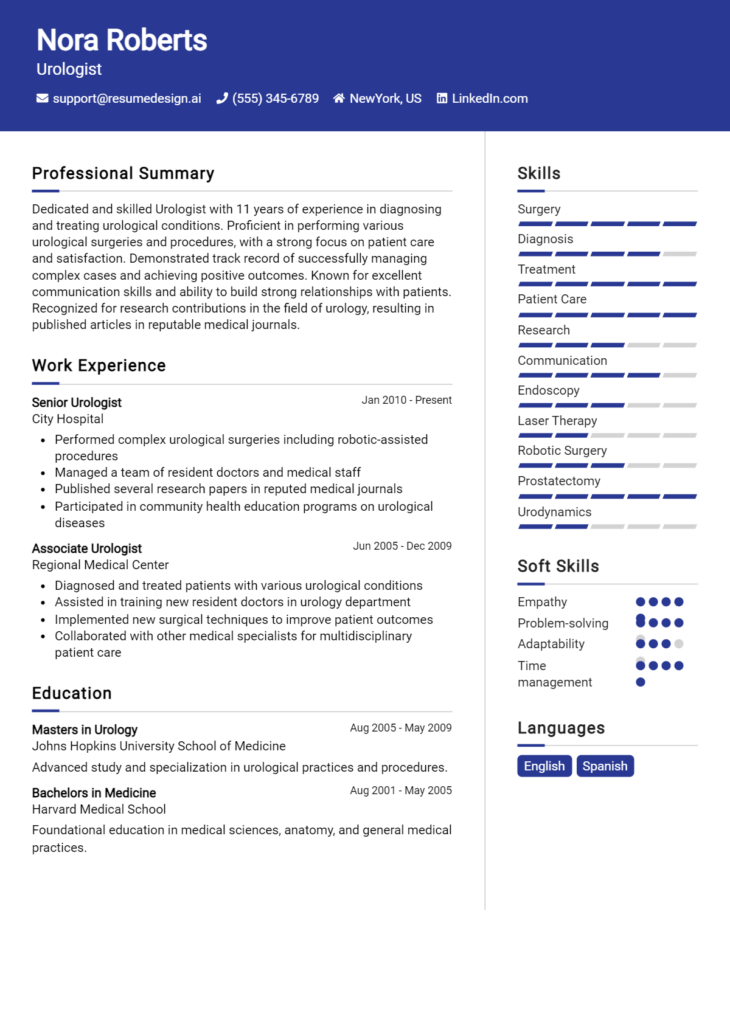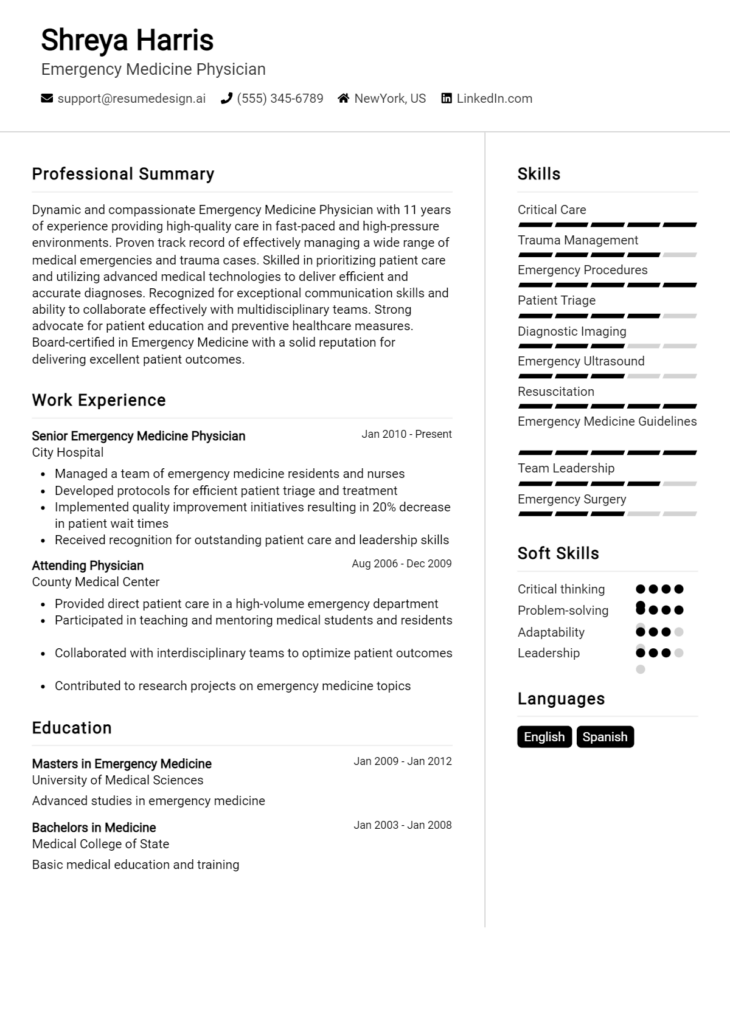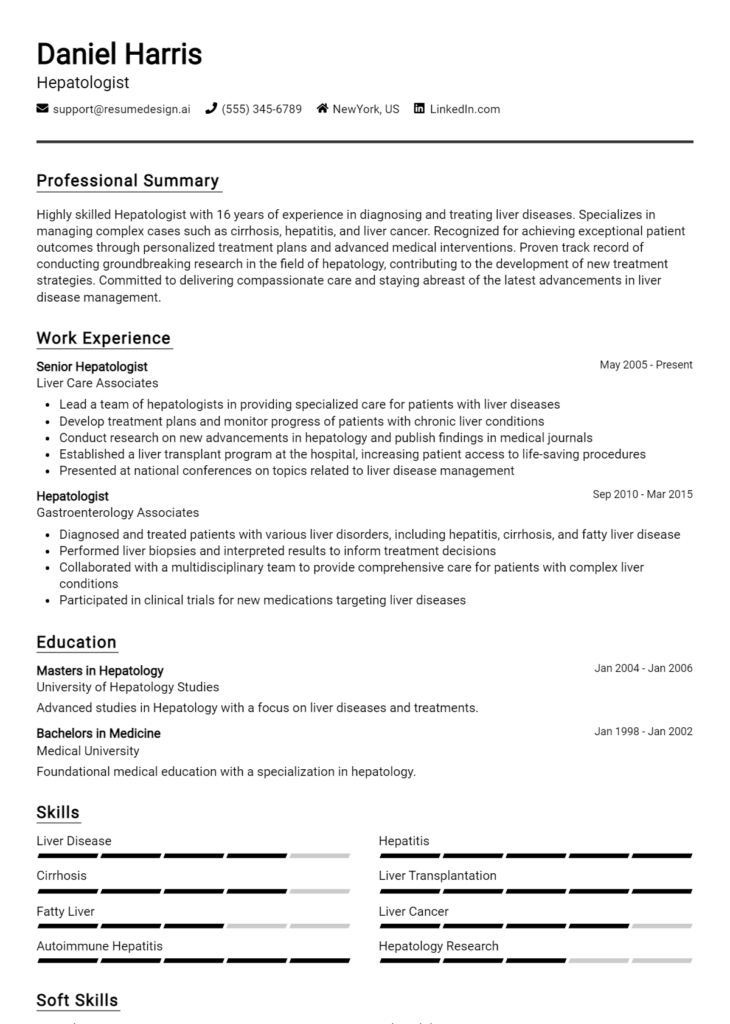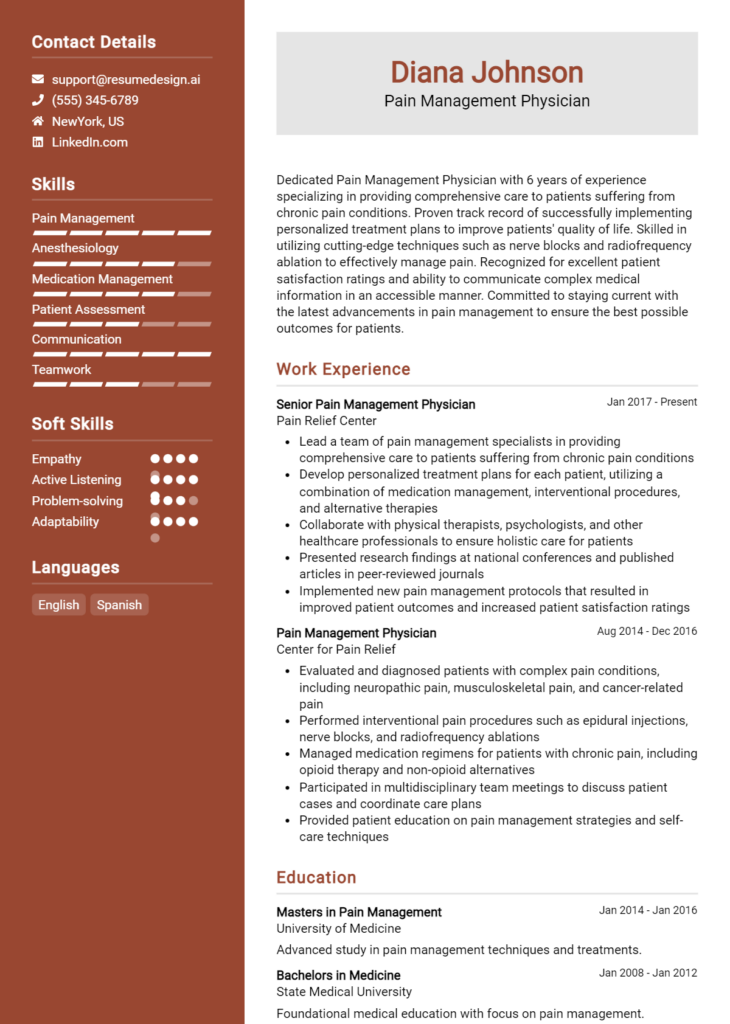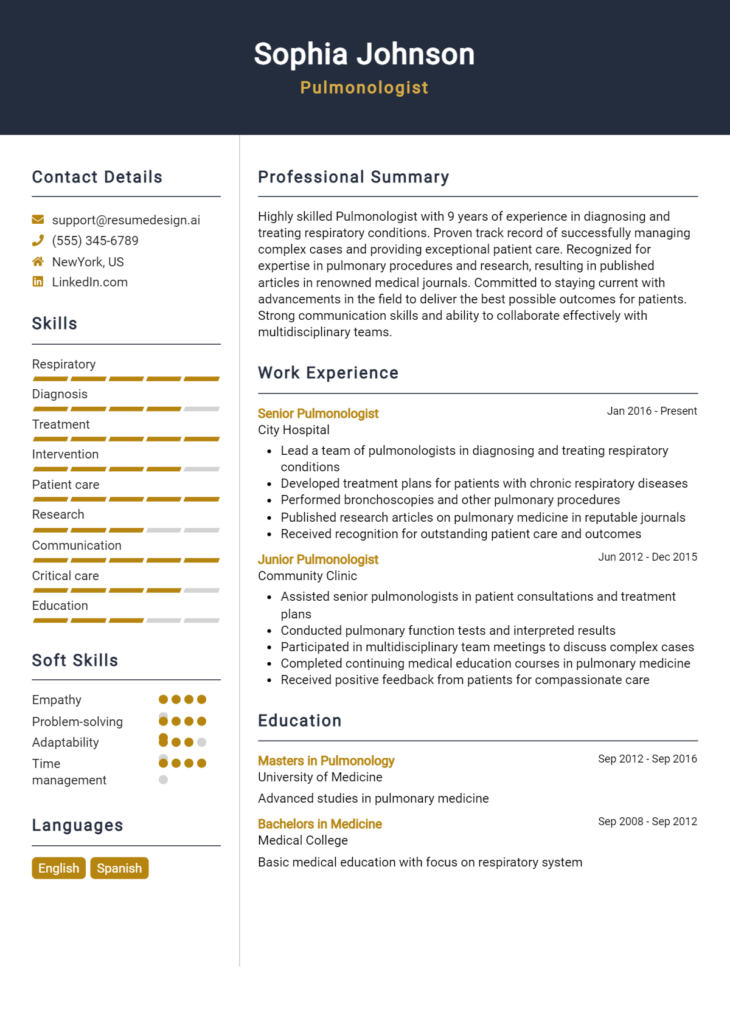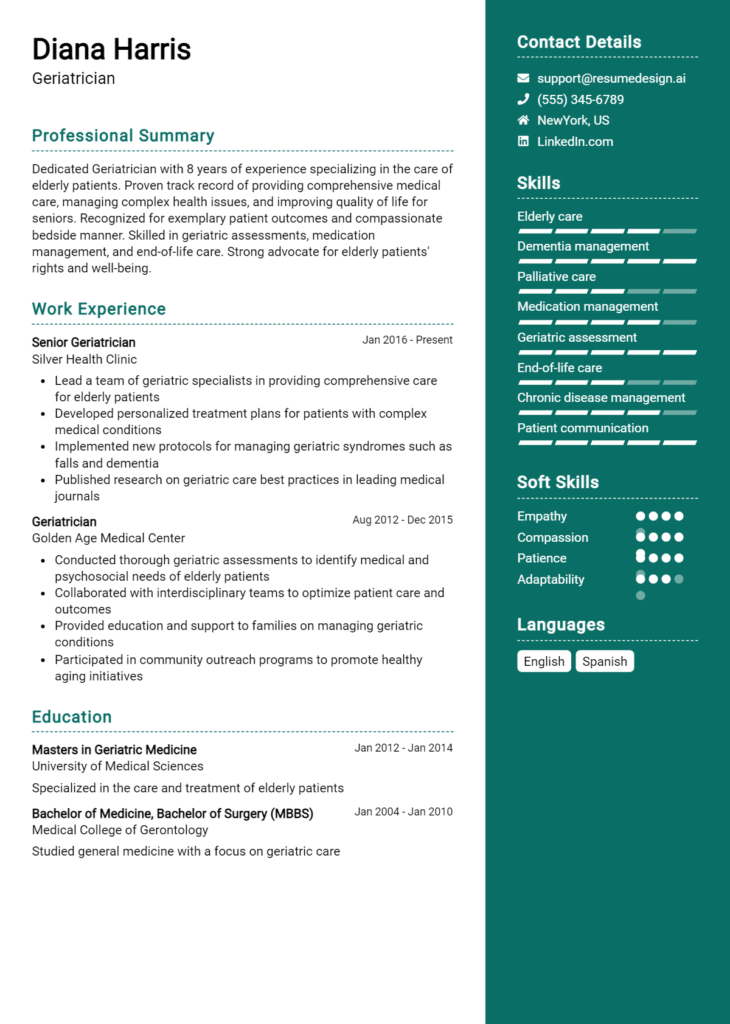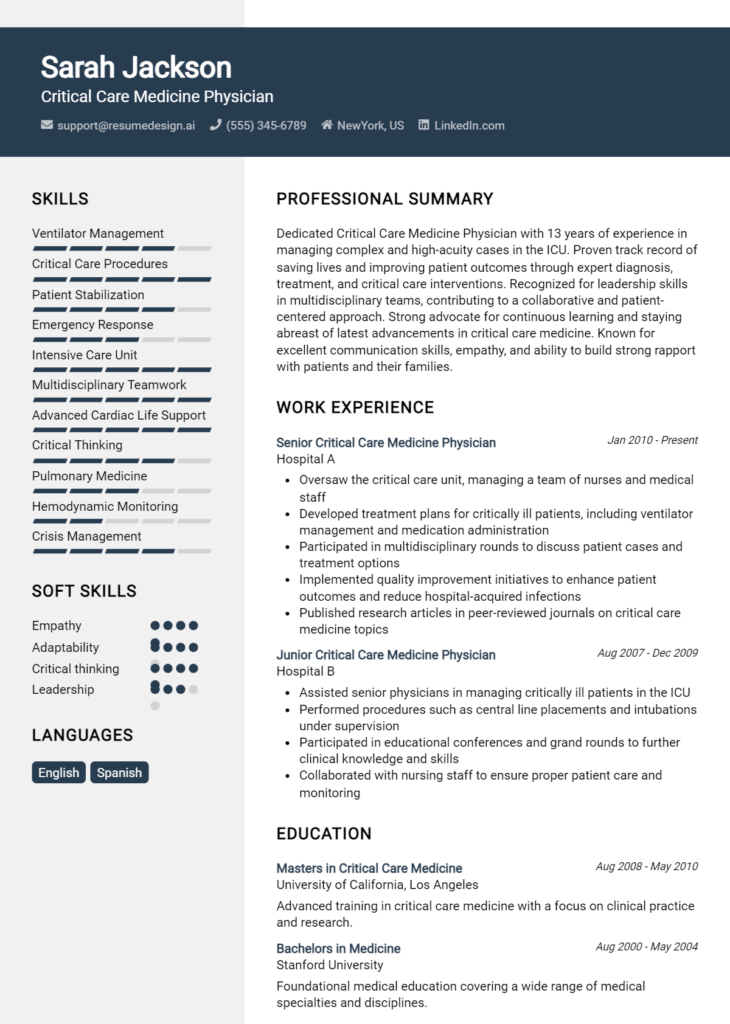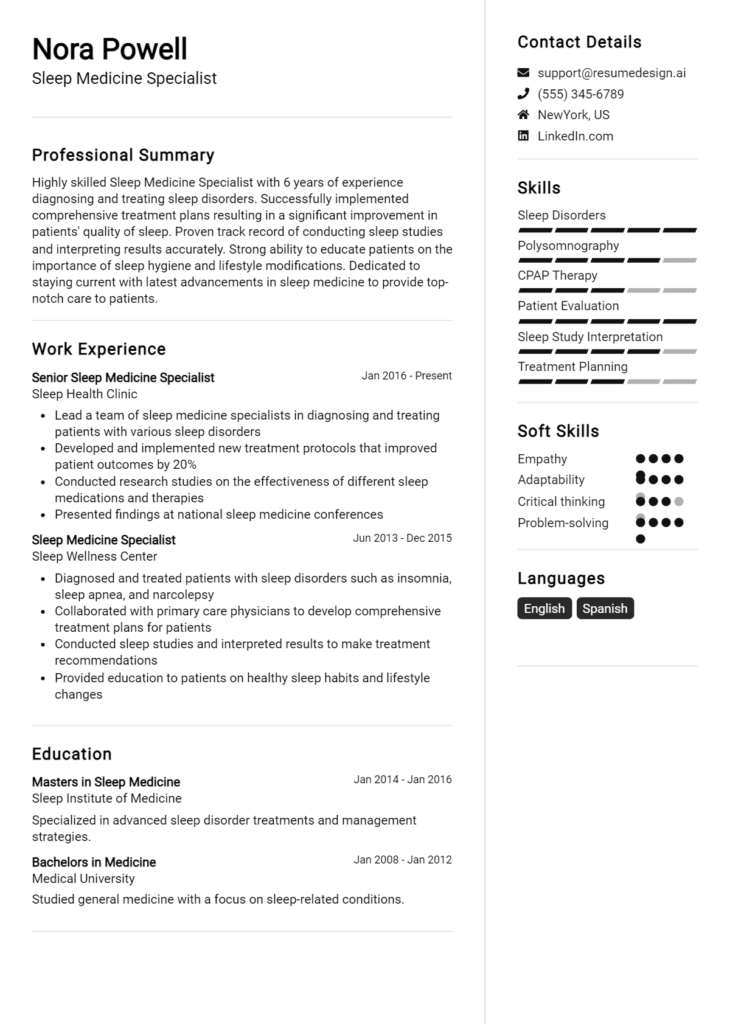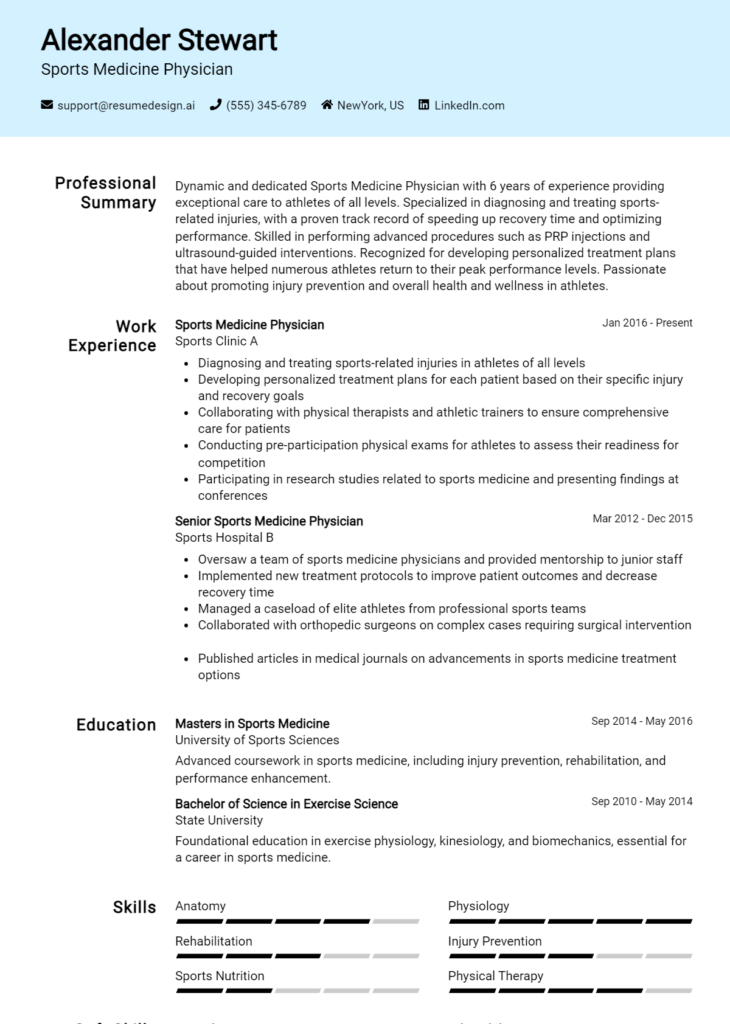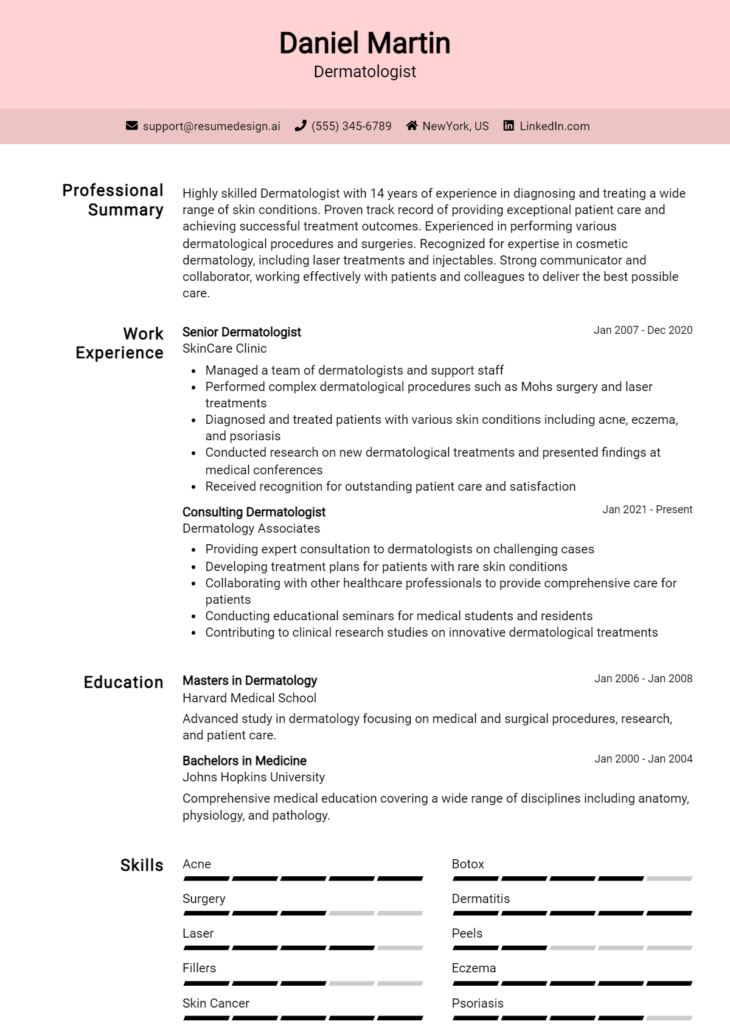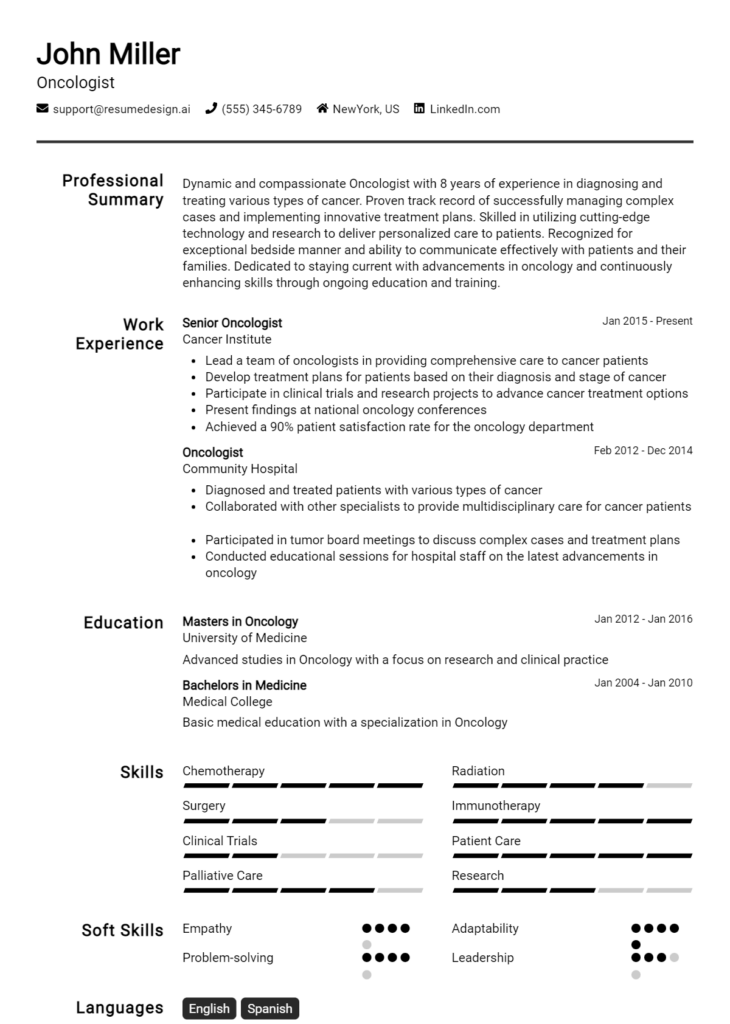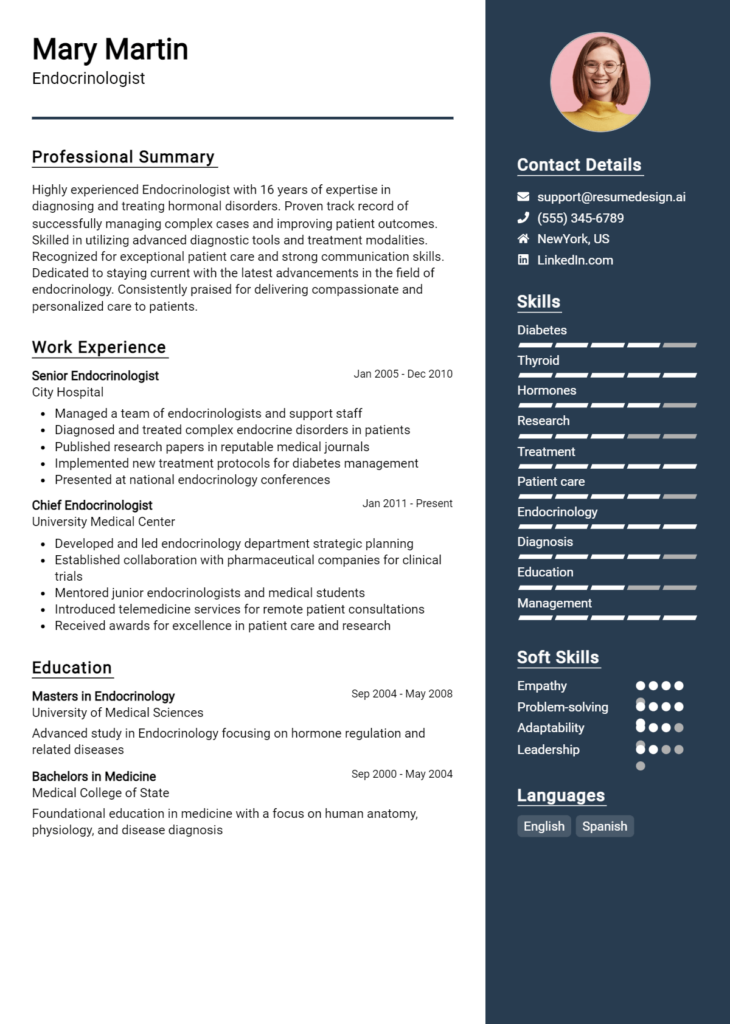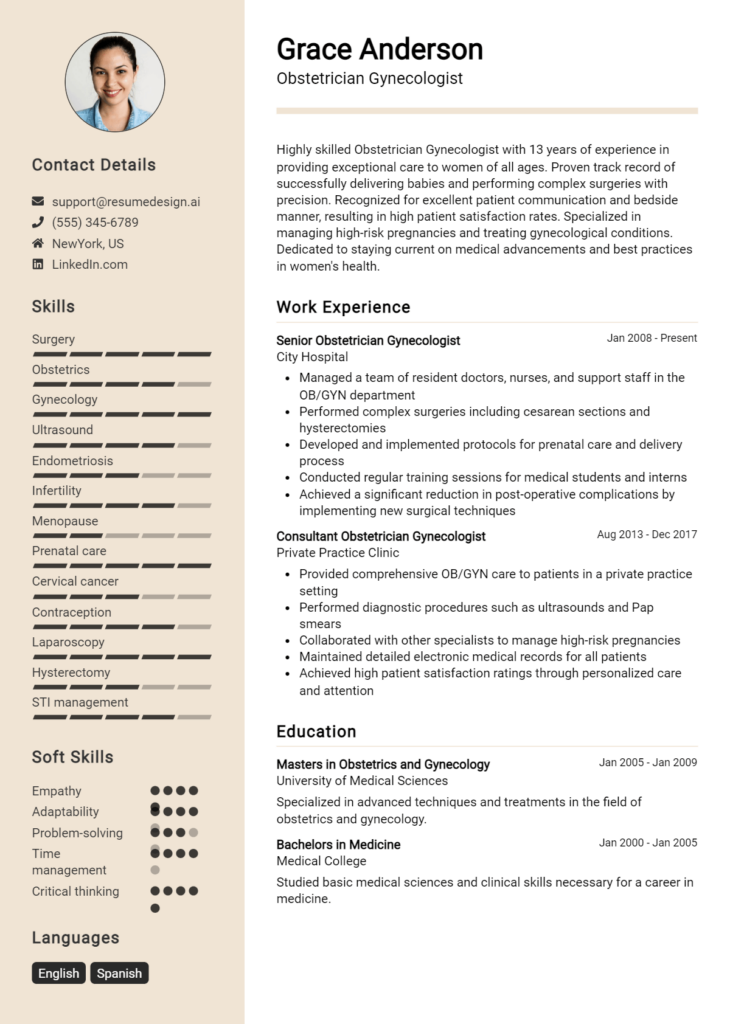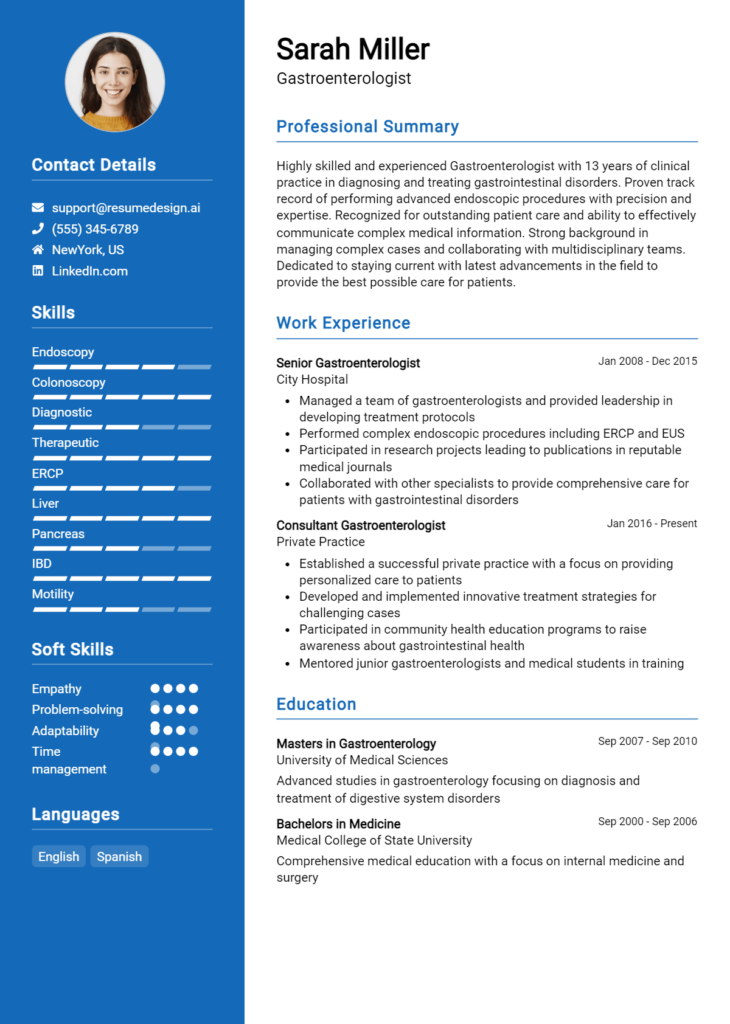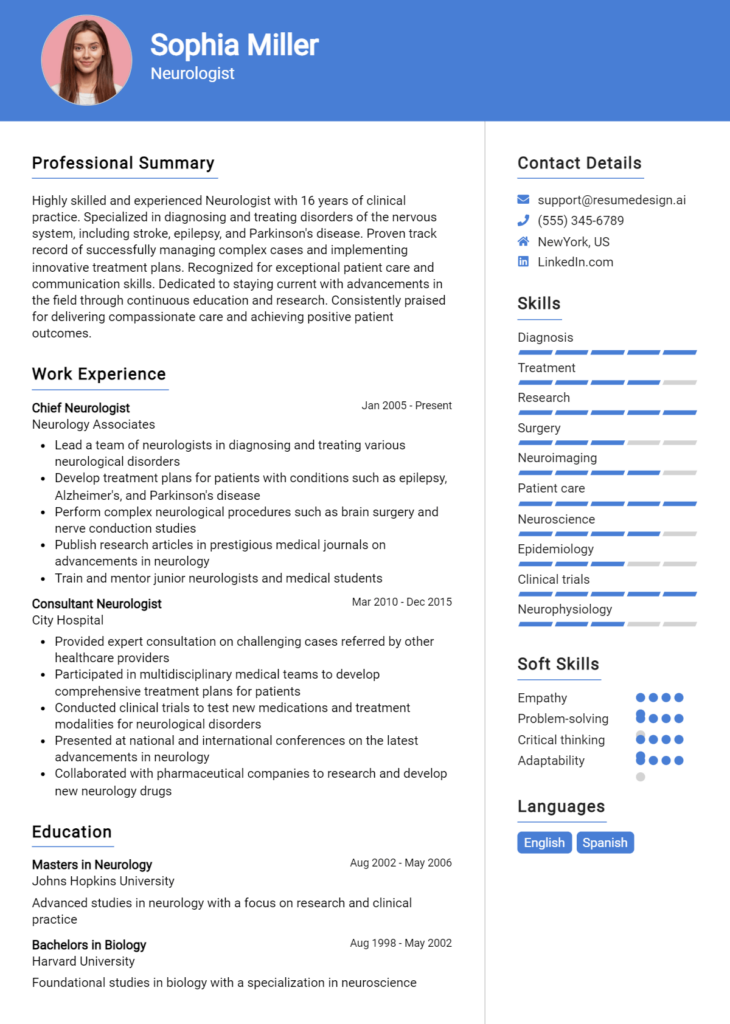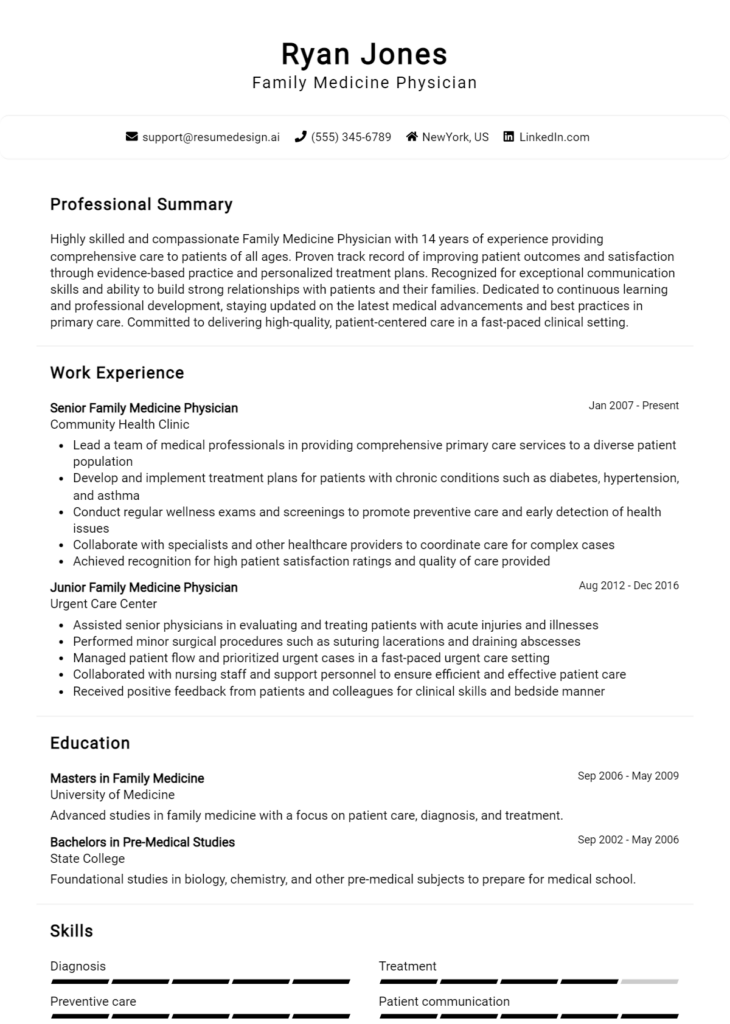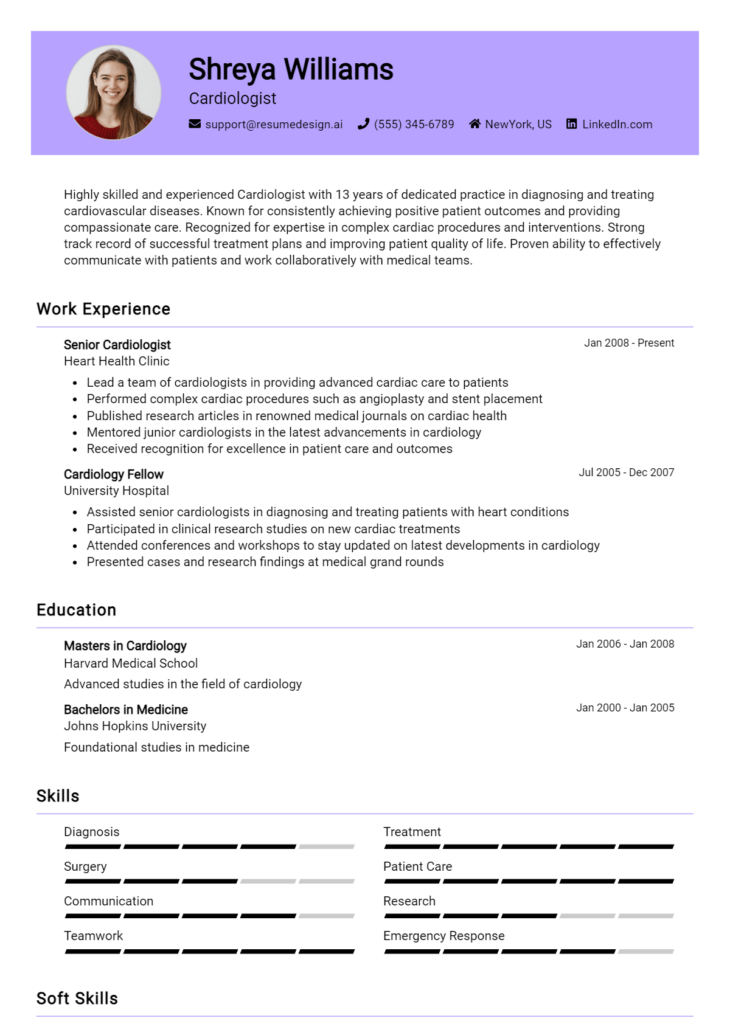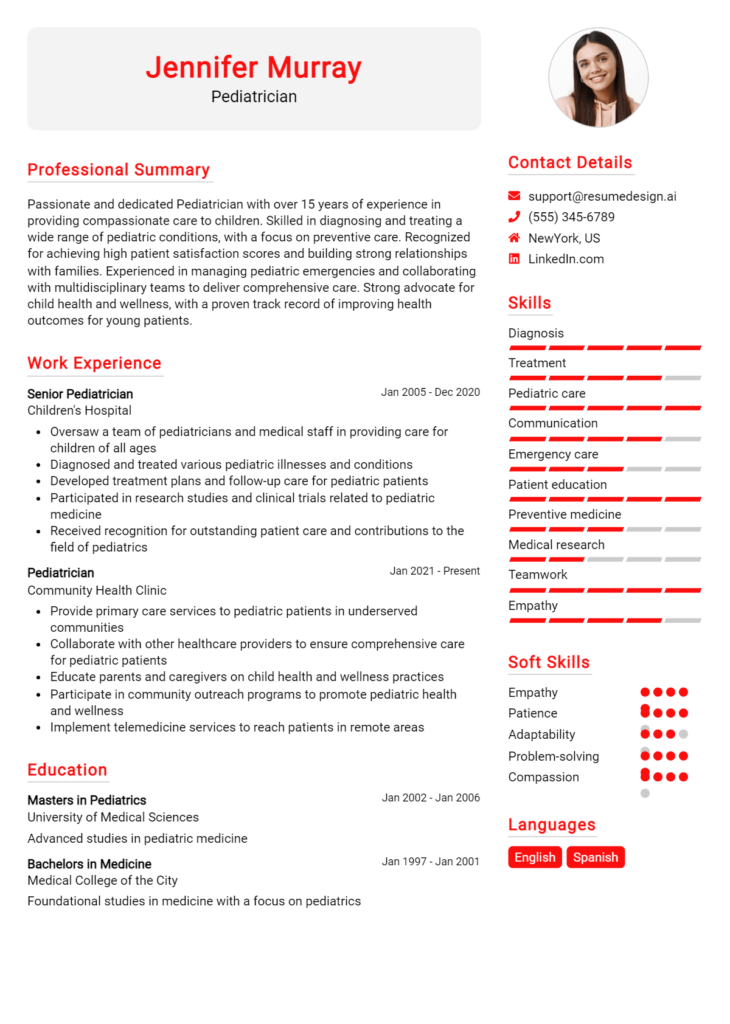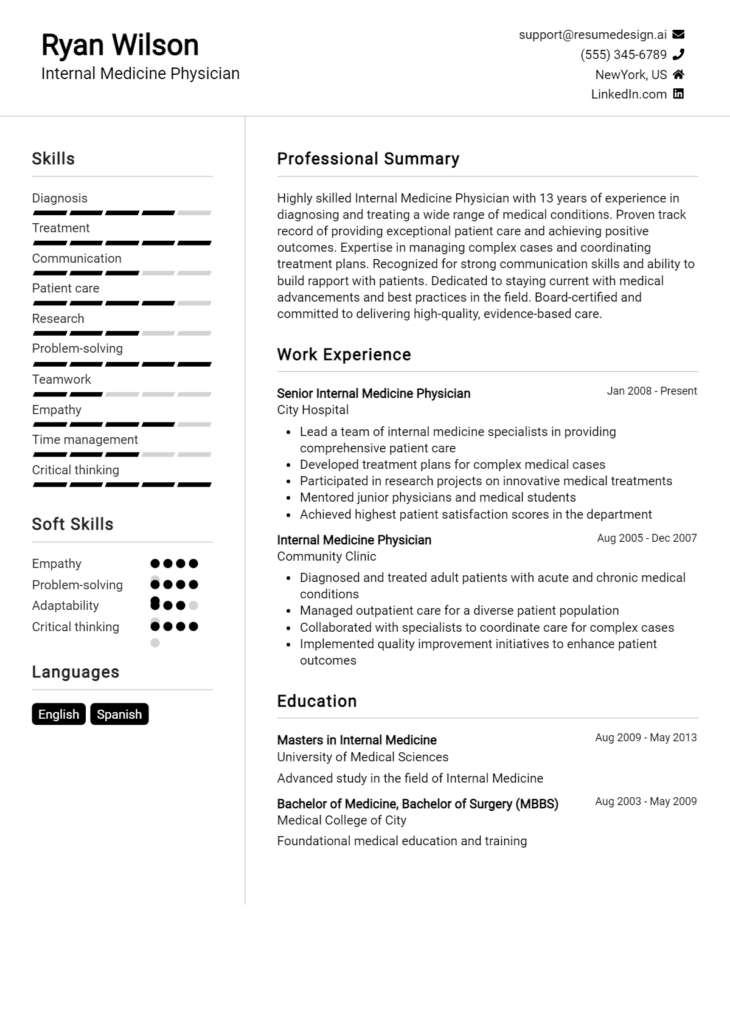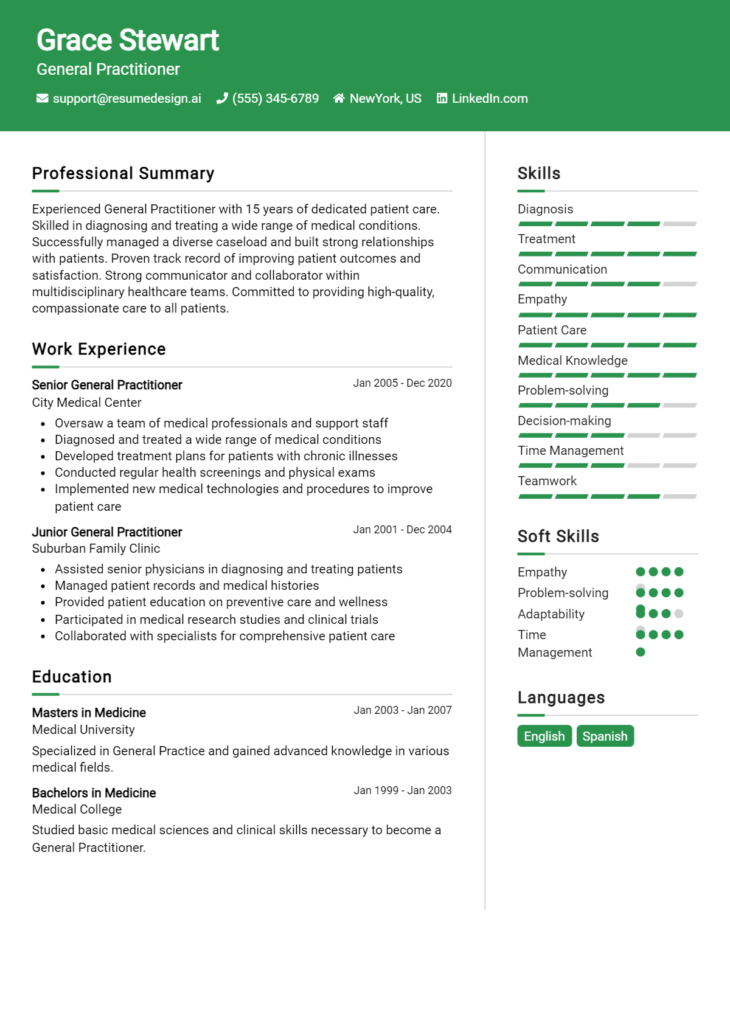Anesthesiologist Core Responsibilities
Anesthesiologists play a crucial role in patient care, bridging surgical teams and nursing staff to ensure safe anesthesia administration. Their core responsibilities include evaluating patients, developing anesthesia plans, monitoring vital signs, and managing post-operative recovery. Essential skills encompass technical proficiency in anesthesia techniques, operational awareness in managing complex cases, and problem-solving abilities to address complications. These competencies align with the organization's goals of patient safety and successful surgical outcomes. A well-structured resume can effectively highlight these qualifications and demonstrate the anesthesiologist's value.
Common Responsibilities Listed on Anesthesiologist Resume
- Conduct pre-anesthesia evaluations and consultations.
- Administer general, regional, and local anesthesia.
- Monitor patients' vital signs during procedures.
- Manage anesthesia-related complications in real-time.
- Collaborate with surgeons and other medical staff.
- Ensure patient safety and comfort throughout the surgical process.
- Provide post-anesthesia care and pain management.
- Educate patients on anesthesia options and risks.
- Document anesthesia procedures and outcomes accurately.
- Stay updated on advancements in anesthesia techniques and technologies.
- Participate in quality assurance and research initiatives.
- Train and mentor junior anesthesia staff and residents.
High-Level Resume Tips for Anesthesiologist Professionals
For Anesthesiologist professionals, a well-crafted resume serves as a vital tool in the competitive healthcare job market. It is often the first impression a candidate makes on a potential employer, and as such, it must effectively reflect both the skills and achievements that set the candidate apart. An anesthesiologist's resume should not only highlight technical expertise but also demonstrate a commitment to patient safety and collaboration within a medical team. This guide will provide practical and actionable resume tips specifically tailored for Anesthesiologist professionals, ensuring that your qualifications shine through in the best light.
Top Resume Tips for Anesthesiologist Professionals
- Tailor your resume to the specific job description to highlight relevant skills and experiences that align with the employer's needs.
- Start with a strong summary statement that encapsulates your expertise, years of experience, and any subspecialties in anesthesiology.
- Showcase relevant clinical experience, including types of procedures performed and anesthetic techniques utilized.
- Quantify your achievements, such as the number of successful procedures completed or improvements in patient outcomes during your tenure.
- Highlight any certifications or advanced training in anesthesia, such as board certification or fellowship training.
- Include your involvement in clinical research or contributions to academic publications to emphasize your commitment to advancing the field.
- Demonstrate teamwork and collaboration skills by mentioning experiences in multidisciplinary teams or leadership roles.
- List technical skills relevant to anesthesiology, such as proficiency in various monitoring technologies or anesthesia delivery systems.
- Keep the format clean and professional, using clear headings and bullet points for easy readability.
- Proofread your resume to eliminate any errors, as attention to detail is crucial in the medical profession.
By implementing these tips, Anesthesiologist professionals can create a compelling resume that significantly increases their chances of landing a desirable position in the field. A polished and targeted resume not only showcases qualifications but also reflects professionalism and dedication—qualities that are essential in the healthcare environment.
Why Resume Headlines & Titles are Important for Anesthesiologist
In the competitive field of anesthesiology, a well-crafted resume headline or title is crucial for standing out among a sea of qualified candidates. A strong headline serves as the first impression, immediately capturing the attention of hiring managers and succinctly summarizing a candidate's key qualifications in a single impactful phrase. It should be concise, relevant, and directly aligned with the specific anesthesiology position being applied for, effectively setting the tone for the rest of the resume and showcasing the candidate's expertise and professionalism.
Best Practices for Crafting Resume Headlines for Anesthesiologist
- Keep it concise: Aim for a headline that is no more than 10-12 words.
- Be role-specific: Tailor the headline to the specific anesthesiology position you are applying for.
- Highlight key skills: Include critical skills or certifications that are relevant to the role.
- Use impactful language: Choose powerful words that convey confidence and capability.
- Showcase experience: Mention years of experience or notable achievements if applicable.
- Avoid jargon: Use clear and straightforward language to ensure clarity.
- Update regularly: Revise your headlines to reflect new skills or experiences as they develop.
- Align with job description: Ensure your headline resonates with the job description and requirements.
Example Resume Headlines for Anesthesiologist
Strong Resume Headlines
Board-Certified Anesthesiologist with 10+ Years of Surgical Experience
Compassionate Anesthesiologist Specializing in Pain Management and Patient Safety
Experienced Anesthesiologist with Proven Track Record in High-Risk Procedures
Skilled Anesthesiologist Committed to Excellence in Patient Care and Outcomes
Weak Resume Headlines
Anesthesiologist Looking for a Job
Experienced Medical Professional
Anesthesiology Position Available
Strong headlines are effective because they immediately convey critical information about the candidate’s qualifications, expertise, and experience in a way that resonates with hiring managers. They are specific, impactful, and relevant to the job, setting the candidate apart from others. In contrast, weak headlines fail to impress because they are vague, generic, and do not provide any insight into the candidate’s unique skills or strengths, ultimately diminishing the chances of catching a hiring manager's attention.
Writing an Exceptional Anesthesiologist Resume Summary
A well-crafted resume summary is a vital component for anesthesiologists seeking to make a strong impression on hiring managers. This brief but impactful section serves as an introduction to your professional qualifications, allowing you to showcase your key skills, relevant experience, and notable accomplishments in the field of anesthesiology. A compelling summary should capture the attention of potential employers quickly, making it essential to be concise and tailored to the specific job at hand. A powerful summary not only highlights your expertise but also sets the tone for the rest of your resume, encouraging hiring managers to delve deeper into your qualifications.
Best Practices for Writing a Anesthesiologist Resume Summary
- Quantify Achievements: Use numbers to highlight your successes, such as the number of procedures performed or patient outcomes.
- Focus on Skills: Emphasize key competencies relevant to anesthesiology, such as pain management, patient monitoring, and emergency response.
- Tailor to Job Description: Customize your summary to align with the specific needs and priorities outlined in the job posting.
- Keep it Concise: Limit the summary to 2-4 sentences, ensuring it remains impactful and easy to read.
- Highlight Relevant Experience: Mention specific roles, responsibilities, or specialties that connect directly to the position you are applying for.
- Showcase Certifications: Include any relevant certifications or training that enhance your qualifications as an anesthesiologist.
- Use Action Verbs: Start sentences with strong action verbs to convey confidence and proactivity in your practice.
- Maintain Professional Tone: Ensure that the language is formal and reflects the professionalism expected in the medical field.
Example Anesthesiologist Resume Summaries
Strong Resume Summaries
Board-certified anesthesiologist with over 10 years of experience in diverse surgical settings, successfully managing anesthesia for more than 3,000 procedures with a 98% patient satisfaction rate. Expertise in regional anesthesia techniques and pain management, committed to optimizing patient outcomes through tailored anesthetic plans.
Compassionate anesthesiologist with a proven track record of reducing post-operative complications by 20% through meticulous patient monitoring and customized pain management protocols. Skilled in both general and regional anesthesia, with extensive experience in orthopedic and cardiovascular surgeries.
Dedicated anesthesiologist with a focus on patient safety and quality care, having implemented new anesthesia protocols that improved recovery times by 30%. Recognized for exceptional communication skills and a collaborative approach within multidisciplinary teams.
Weak Resume Summaries
Anesthesiologist with experience in the field, looking for a new opportunity to apply skills.
Experienced medical professional with a background in anesthesia and patient care.
The strong resume summaries are considered effective because they provide concrete examples of achievements, quantify results, and directly relate to the anesthesiologist role. They highlight specific skills and experiences that resonate with hiring managers. In contrast, the weak summaries are vague and generic, lacking the necessary detail and impact to capture attention, which diminishes their effectiveness in presenting the candidate's qualifications.
Work Experience Section for Anesthesiologist Resume
The work experience section of an Anesthesiologist resume is crucial for demonstrating the candidate's technical skills and their ability to manage teams effectively while delivering high-quality patient care. This section not only showcases the depth of experience in administering anesthesia and monitoring patient safety but also highlights leadership capabilities in collaborating with surgical teams and medical staff. Quantifying achievements, such as the number of successful procedures performed or improvements in patient outcomes, and aligning the experience with industry standards are essential for making a compelling case to potential employers.
Best Practices for Anesthesiologist Work Experience
- Focus on quantifiable results, such as the percentage of successful anesthetic outcomes.
- Highlight specific technical skills related to anesthesia techniques and equipment used.
- Describe leadership roles in managing anesthesia teams during complex surgical procedures.
- Emphasize collaboration with surgeons, nurses, and other medical professionals.
- Include relevant certifications and training that enhance technical expertise.
- Use action verbs to convey a sense of proactivity and impact.
- Align experiences with the latest industry standards and best practices.
- Tailor the work experience section to reflect the job description of the position being applied for.
Example Work Experiences for Anesthesiologist
Strong Experiences
- Administered anesthesia for over 1,500 surgical procedures, achieving a 98% patient satisfaction rate as measured by post-operative surveys.
- Led a team of 5 anesthesia providers in a high-volume surgical center, resulting in a 30% decrease in procedure delays through improved coordination and communication.
- Implemented a new anesthesia monitoring protocol that reduced adverse drug reactions by 25% over two years.
- Collaborated with multidisciplinary teams to develop a pain management program that decreased opioid use by 40% in post-operative patients.
Weak Experiences
- Worked as an anesthesiologist in various surgeries.
- Responsible for giving anesthesia to patients.
- Participated in some meetings with other medical staff.
- Helped with patient care during operations.
The examples presented are considered strong because they effectively quantify outcomes and demonstrate leadership and collaboration, showcasing the candidate's impact on patient care and operational efficiency. Conversely, the weak experiences lack specificity and measurable results, failing to convey the candidate's true capabilities and contributions in their role as an anesthesiologist.
Education and Certifications Section for Anesthesiologist Resume
The education and certifications section of an Anesthesiologist resume is critical in establishing the candidate's academic background and professional qualifications. This section not only showcases the essential degrees and certifications acquired during their training but also reflects the candidate's commitment to continuous learning and professional development in a rapidly evolving field. By detailing relevant coursework, specialized training, and industry-recognized credentials, candidates can significantly enhance their credibility and demonstrate their alignment with the specific requirements of the anesthesiology role they are pursuing.
Best Practices for Anesthesiologist Education and Certifications
- List your highest degree first, emphasizing any relevant medical school education.
- Include all applicable certifications, such as Board Certification in Anesthesiology.
- Highlight any specialized training or fellowships that enhance your qualifications.
- Provide specific coursework that is relevant to anesthesiology, such as pharmacology or pain management.
- Use clear and concise language to ensure readability and impact.
- Update the section regularly to reflect any new certifications or continuing education.
- Consider including memberships in professional organizations, such as the American Society of Anesthesiologists (ASA).
- Tailor the content to match the specific requirements outlined in the job description.
Example Education and Certifications for Anesthesiologist
Strong Examples
- Doctor of Medicine (MD), Harvard Medical School, 2015
- Board Certified in Anesthesiology, American Board of Anesthesiology, 2018
- Fellowship in Pain Medicine, Johns Hopkins University, 2019
- Advanced Cardiac Life Support (ACLS) Certification, 2023
Weak Examples
- Bachelor of Arts in Psychology, State University, 2010
- Certification in Basic Life Support (BLS), 2015 (not current)
- Online Course in General Medicine, 2020
- High School Diploma, Local High School, 2006
The examples provided are considered strong because they highlight relevant degrees, certifications, and specialized training that are directly applicable to the field of anesthesiology, showcasing a well-rounded and committed professional. In contrast, the weak examples lack direct relevance to anesthesiology and include outdated or non-specific qualifications, which do not enhance the candidate's profile for the role they are seeking.
Top Skills & Keywords for Anesthesiologist Resume
As an Anesthesiologist, possessing a blend of essential skills is crucial for ensuring patient safety and delivering high-quality care during surgical procedures. The effectiveness of an anesthesiologist greatly depends on their ability to manage complex medical situations, communicate with surgical teams, and provide compassionate patient care. Highlighting relevant skills in your resume not only showcases your qualifications but also demonstrates your capability to handle the demands of this specialized medical field. A well-crafted resume with a focus on both hard and soft skills can significantly enhance your chances of landing interviews and advancing your career in anesthesia.
Top Hard & Soft Skills for Anesthesiologist
Soft Skills
- Excellent communication
- Strong decision-making
- Empathy and compassion
- Team collaboration
- Attention to detail
- Ability to work under pressure
- Time management
- Problem-solving skills
- Adaptability
- Leadership qualities
Hard Skills
- Proficiency in anesthesia techniques
- Knowledge of pharmacology
- Patient assessment and monitoring
- Familiarity with anesthesia equipment
- Experience in regional anesthesia
- Understanding of surgical procedures
- Ability to manage anesthesia complications
- Knowledge of pain management strategies
- Certification in Advanced Cardiac Life Support (ACLS)
- Proficient in electronic health record (EHR) systems
For a successful anesthesiologist resume, integrating these skills along with your work experience will create a compelling narrative that highlights your professional journey and expertise in the field of anesthesia.
Stand Out with a Winning Anesthesiologist Cover Letter
Dear [Hiring Manager's Name],
I am writing to express my interest in the Anesthesiologist position at [Hospital/Clinic Name], as advertised on [Job Board/Website]. With a comprehensive background in anesthesiology, bolstered by [X years] of clinical experience and a commitment to patient-centered care, I am excited about the opportunity to contribute to your esteemed team. My extensive training in various anesthetic techniques, coupled with my ability to collaborate effectively within multidisciplinary teams, enables me to provide high-quality care to patients across diverse surgical settings.
Throughout my career, I have successfully managed anesthesia for a wide range of surgical procedures, including complex surgeries such as [specific types of surgeries relevant to the position]. My proficiency in utilizing advanced monitoring technologies and my dedication to ensuring patient safety have consistently resulted in positive outcomes. I am particularly skilled in developing individualized anesthesia plans that take into account each patient’s unique medical history and needs, ensuring a smooth surgical experience and optimal recovery. Additionally, my strong communication skills allow me to effectively educate patients and their families about the anesthesia process, alleviating any concerns they may have.
I am particularly impressed by [Hospital/Clinic Name]'s commitment to [specific value or initiative of the organization], and I am eager to contribute to this mission. I believe my clinical expertise, combined with my passion for continuous learning and improvement in anesthetic practices, aligns well with your organization’s goals. I am excited about the possibility of joining your team and hope to bring my skills in both clinical practice and patient advocacy to enhance the quality of care provided at [Hospital/Clinic Name].
Thank you for considering my application. I look forward to the opportunity to discuss how my experience and vision align with the needs of your team. Please feel free to contact me at [Your Phone Number] or [Your Email] to arrange a convenient time for us to speak.
Sincerely,
[Your Name]
[Your Address]
[City, State, Zip]
[Your LinkedIn Profile or Professional Website]
Common Mistakes to Avoid in a Anesthesiologist Resume
Crafting a compelling resume is essential for anesthesiologists seeking to secure a position in a competitive job market. However, there are several common mistakes that applicants often make, which can undermine their chances of landing an interview. By being aware of these pitfalls, anesthesiologists can create a resume that effectively highlights their skills, experience, and qualifications. Here are some common mistakes to avoid:
Lack of Specificity: Failing to include specific details about procedures performed or patient outcomes can make a resume seem vague. Use precise language to describe your experiences and achievements.
Overly Complex Language: While it's important to demonstrate expertise, using overly technical jargon can alienate non-medical HR personnel. Aim for clarity and conciseness in your descriptions.
Ignoring Keywords: Many employers use Applicant Tracking Systems (ATS) to filter resumes. Not incorporating relevant keywords from the job description can lead to your resume being overlooked.
Inconsistent Formatting: A cluttered or inconsistent resume layout can be visually unappealing and hard to read. Use a clean, professional format with consistent font sizes and bullet points for easy navigation.
Omitting Continuing Education: Anesthesiology is a constantly evolving field, and not highlighting ongoing education or certifications can make you appear stagnant. Include recent courses or training relevant to the specialty.
Listing Irrelevant Experience: Including unrelated job experiences can dilute the impact of your medical qualifications. Focus on positions and skills that directly relate to anesthesiology.
Neglecting Soft Skills: While technical skills are crucial, anesthesiologists also need strong interpersonal skills. Failing to mention your ability to communicate effectively or work as part of a team can be a missed opportunity.
Typos and Grammatical Errors: Simple mistakes can undermine your professionalism. Always proofread your resume multiple times or have someone else review it to catch any errors before submission.
Conclusion
As an anesthesiologist, you play a crucial role in patient care, ensuring safety and comfort during surgical procedures. Your expertise not only requires deep medical knowledge but also the ability to communicate effectively with surgical teams and patients. Key responsibilities include pre-operative assessments, administering anesthesia, monitoring patients during surgery, and post-operative care.
In this article, we explored the essential skills and qualifications needed for an anesthesiologist, including strong analytical abilities, attention to detail, and excellent problem-solving skills. We also discussed the importance of staying updated with the latest advancements in anesthesia techniques and technology to provide the best care possible.
As you reflect on your career and prepare for new opportunities, it’s essential to have a polished resume that highlights your experience and skills. Consider reviewing your anesthesiologist resume to ensure it effectively communicates your qualifications.
To assist you in this process, a variety of resources are available:
- Check out resume templates that can help you structure your resume effectively.
- Utilize the resume builder for an easy and professional way to create your resume.
- Browse through resume examples to see how others in your field present their experience.
- Don’t forget to craft a compelling introduction with our cover letter templates that can set you apart from other applicants.
Take the next step in your career by ensuring your resume reflects your expertise as an anesthesiologist. Start today!

